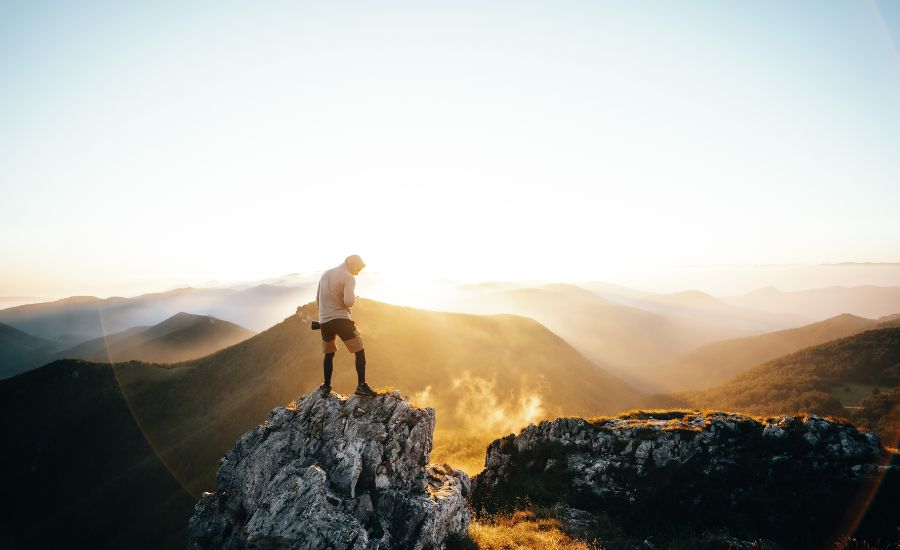Best Overnight Hikes In British Columbia
I’m one of the fortunate ones. Over the past several years, I’ve had the privilege of venturing into the heart of British Columbia’s wild landscapes, often with a trusty backpack in tow.
While I can’t claim to have tackled every overnight hike in this province, I can tell you that each one I’ve explored holds its own unique magic. Most of them have left me with that overwhelming sense of joy and appreciation for life, especially when I’ve finally dropped my backpack at the end of a long day’s hike.
In this article, I’m excited to share my personal experiences and insights into some of the best overnight hikes in British Columbia, each one tried and tested by yours truly.
West Coast Trail: A Rugged Coastal Escape
My journey begins on Vancouver Island’s West Coast Trail. This 75-kilometer coastal trail is an absolute must for any hiker looking for a challenge and breathtaking views.
My advice? Invest in a good pair of waterproof hiking boots and trekking poles to navigate the rugged terrain and river crossings. A durable backpack with ample space for essentials, like a first aid kit, extra layers, and a water purifier, is crucial.
Tip: Secure permits well in advance, as this trail is in high demand. And don’t forget to check the tides before setting off; some sections are only passable at low tide.
Juan de Fuca Marine Trail: Coastal Bliss
Adjacent to the West Coast Trail, the Juan de Fuca Marine Trail offers a slightly less strenuous but equally captivating coastal experience. Be sure to pack a good rain jacket and a sturdy tent with a rainfly, as the weather can be unpredictable. A reliable water filter or purification tablets will come in handy for drinking water from streams along the way.
Tip: Plan your hike carefully, as there are limited access points to the trail. Consider arranging a shuttle service to simplify logistics.
Check out some of my most popular posts to read more:
- Best Place For A Birthday Party In British Columbia
- Best Place To Visit In Coquitlam BC
- 12 Interesting Things About Quadra Island In Canada
- 7 Best Beaches In Vancouver For Family
- 7 Best Fishing Lake In British Columbia
Berg Lake Trail: Alpine Paradise
For those who crave alpine adventures, the Berg Lake Trail in the Canadian Rockies is a dream come true. This trail takes you to the stunning Berg Lake, nestled beneath the towering Mount Robson.
Make sure to have a warm sleeping bag, as temperatures can drop significantly at night. Additionally, a portable stove for cooking hot meals and a bear canister for storing food safely are essential.
Tip: Permits for this trail can be competitive, so book early. And remember to store your food properly to prevent wildlife encounters.
Garibaldi Lake: A Weekend Getaway
A short drive from Vancouver, Garibaldi Lake is perfect for a weekend escape. A reliable water-resistant backpack cover will keep your gear dry during sudden rain showers. Invest in a good headlamp with spare batteries for those early morning starts or late-night adventures to catch the stars.
Tip: Arrive early at the trailhead, especially on weekends, as this hike is popular, and parking can fill up quickly.
Hesquiat Peninsula: The Untouched Wilderness
If you’re seeking a truly remote experience, the Hesquiat Peninsula on Vancouver Island is a gem. Ensure you have a quality map and compass or a GPS device, as the trail is less traveled and can be challenging to navigate. Don’t forget bear spray for added safety in bear country.
Tip: Check for local tide information before hiking, as the tides can affect access to certain areas of the trail.
Chilkoot Trail: A Journey into History
Starting in British Columbia but ending in Alaska, the Chilkoot Trail is a historic adventure. A lightweight, four-season tent is ideal for this hike, given the varying weather conditions. Carry a first aid kit with essentials like blister treatment, as the terrain can be tough on your feet.
Tip: Remember that crossing the border into the United States requires proper documentation, so plan accordingly.
15 Hiking Essentials You Must Have
When embarking on an overnight hiking trip, it’s crucial to pack wisely to ensure your safety and comfort. Here’s a list of essential items to bring:
- Backpack: A comfortable, appropriately sized backpack to carry your gear.
- Tent: A lightweight, durable tent for shelter.
- Sleeping Bag: A sleeping bag suitable for the expected weather conditions.
- Sleeping Pad: An insulated sleeping pad for comfort and warmth.
- Footwear: Sturdy, waterproof hiking boots with good ankle support.
- Navigation Tools:
- Headlamp/Flashlight: With extra batteries.
- Water Containers: Collapsible water bottles or hydration reservoirs.
- Multi-Tool/Knife: Handy for various tasks and emergencies.
- First Aid Kit: Including bandages, pain relievers, antiseptic wipes, and any personal medications.
- Emergency Shelter: Such as an emergency space blanket or bivy.
- Fire-Starting Kit: Waterproof matches, a lighter, and firestarter.
- Backpacking Stool/Chair: Lightweight seating for comfort around the campfire.
- Trash Bags: For packing out all waste and keeping the environment clean.
- Repair Kit: Gear repair items like duct tape, patches, and a sewing kit.
- Map Case/Ziplock Bags: To protect maps and electronics from moisture.
- Identification and Permits: Personal identification, any necessary permits, and emergency contact information.
- Toiletries: Toilet paper, trowel for digging a cat hole, and personal hygiene items.
- Insect Protection: Bug repellent and a head net for areas with biting insects.
- Trekking Poles: For added stability and reduced strain on your knees.
- Bear Canister or Bear Bag: To store food safely and prevent wildlife encounters.
- Whistle: For signalling in emergencies.
Can I bring my dog on overnight hikes in BC?
Yes, you can bring your dog on overnight hikes in British Columbia can be a wonderful adventure. However, it’s essential to research and follow the specific rules and regulations of the trail or wilderness area you plan to visit.
Not all trails allow dogs, and some may have restrictions based on the time of year or potential wildlife encounters. Always ensure your dog is well-behaved, and be a responsible pet owner by keeping your dog on a leash where required and cleaning up after them to leave no trace.
What kind of food should I bring for overnight hikes?
Foods that are easy to carry and cook, like dehydrated meals or energy bars, are good for hiking.
For overnight hikes, selecting the right food for overnight hikes is crucial. It’s best to pack lightweight and easy-to-carry options like dehydrated meals, energy bars, nuts, and dried fruits. These foods provide essential nutrients and energy without adding excessive weight to your backpack.
Additionally, don’t forget to bring a reliable method for cooking or heating your meals, such as a lightweight stove and cooking pot. Lastly, ensure you have enough clean water or a means to purify water from natural sources to stay hydrated and rehydrate your dehydrated meals.
Are there any restrictions or rules I should be aware of when camping in the wilderness?
From my personal experience, camping in the wilderness requires respecting specific rules and guidelines. This involves obtaining permits, following designated camping zones, and adhering to the Leave No Trace principle to minimize our impact on nature.
Additionally, it is crucial to be considerate of noise levels, campsite locations, and trail etiquette contribute to a safe and enjoyable wilderness adventure for everyone.
Final Words
Embarking on these overnight hikes in British Columbia has been a life-changing experience for me. The key to a successful adventure is preparation and having the right gear, from hiking boots to tents and navigation tools.
Remember to respect the environment, follow Leave No Trace principles, and be aware of local regulations and safety recommendations.
So, fellow adventurers, lace up your hiking boots, pack your bags with the essentials, and let British Columbia’s wilderness captivate your soul. Happy hiking!


